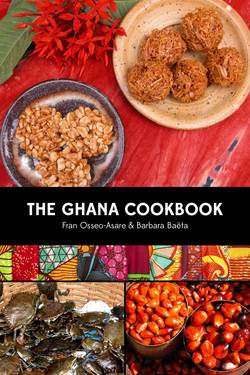Читать книгу The Ghana Cookbook - Fran Osseo-Asare - Страница 10
На сайте Литреса книга снята с продажи.
ОглавлениеThe Ghanaian Pantry in North America
To seriously cook Ghanaian food, especially outside of Ghana, requires stocking one’s kitchen and pantry with a few special items. While any well-appointed kitchen with stove, oven, microwave, electric blender or food processor, spice grinder, pots and pans, etc. will allow you to cook the recipes in this book the following items are wonderful additions if available:
• An asanka (for grinding)
• Wooden masher (apotoyewa/apotoriwa or tapoli)
• Wooden stirring stick (much sturdier than standard wooden spoons)
• Cheesecloth (for straining to make beverages, puddings, etc.)
For cooking traditional meals, several pantry items may need to be ordered online or obtained at an African or international market (see Resources, page 238). Some of them may also be replaced by more familiar substitutes. Here are the basics I like to keep on hand, listed by priority (see Glossary for detailed descriptions):
• Gari (cassava meal) [No substitute]
• Fufu flours (yam, plantain, cocoyam) [Substitutes: Potato starch and instant mashed potatoes]
• Palm oil (especially spiced dzomi or zomi) [No taste substitute; but the color red can be duplicated by adding paprika to vegetable oil]
• Dried shrimp/crayfish/herrings (includes smoked and dried, ground and whole) [Substitute: possibly fish sauce]
• Canned cream of palm fruit [No substitute]
• Dried hibiscus flowers (roselle) [No substitute]
• Agushi (dried melon seeds) [Substitute: Hulled pumpkin seeds]
• Attiéke (cassava couscous) [Substitute: wheat couscous]
• Ground red pepper from Ghana (When “dried ground red pepper” is listed in this cookbook it refers to regular ground red cayenne pepper from the U.S. If substituting Ghanaian ground red pepper, reduce amounts by one-fourth as it is hotter.)
• Hwentia (Xylopica aethiopica) [Substitute: black peppercorns (Piper guineese)]
• Ashanti pepper [Substitute: whole black peppercorns]
• Stoneground white corn flour
• Toasted corn flour (ablemamu; see page 29)
• Fonio, African millet, or African millet flour [Substitute: any millet or flour]
• Koko flour
• Bambara beans [Substitute: garbanzo beans]
• Hausa koko mix
• Dried white corn [Substitute: dried hominy]
• Beef, chicken, shito, and shrimp-flavored Maggi or Royco seasoning cubes. [Substitute: any seasoning cubes/granules, bouillon cubes, or stock]. Note: I prefer not to use seasoning cubes, and substitute stock or seasoned salt and other flavorings, as indicated in many of the recipes.
Other staples I like to have in my cupboard that are more easily found in the U.S. include:
• Adobo or other seasoned salt
• Canned corned beef (Exeter or other)
• Canned Goya sardines in tomato sauce or oil, or other canned fish
• Canned evaporated milk
• Peanut oil
• Dry-roasted unsalted peanuts
• Natural-style creamy peanut butter or “groundnut paste”
• Hulled sesame seeds
• Dried unsweetened flaked coconut
• Canned coconut milk
• Dried black-eyed peas
• Dried red pepper flakes
• Hot sauce/condiment (shirachi, sambal oelek, shito, etc.)
• Canned tomatoes
• Tomato paste
• Rice (basmati, jasmine, broken, long-grain, medium grain, indigenous red, etc.)
• Curry powder or masala
• Dried herbs such as thyme, basil, aniseed, bay leaves
African markets as well as Latin American and Asian markets in the U.S. are good sources for some fresh produce used in Ghana recipes, such as fresh African yams (especially puna), small green (apim) or large ripe plantains, cassava/manioc, cocoyams/taro, various types of peppers, and garden eggs (a type of eggplant). Other perishable goods I like to keep on hand are:
• Fresh ginger
• Fresh garlic
• Fresh chili peppers such as habanero (Scotch bonnet), cayenne, jalapeno
• Fresh tomatoes
• Onions, shallots
• Tropical fruits as available (papaya, pineapple, oranges, lemons, limes, watermelon, avocado, cantaloupe, etc.)
• Okra
• Spinach or other greens
• Banku dough (see page 31)
• Frozen mango and banana chunks
• Smoked fish
• Margarine or butter (Note: butter is generally not available in Ghana, so people traditionally use margarine; however, butter may be substituted in place of margarine in all recipes.)
For more detailed information on Ghanaian culinary terms, ingredients, cooking techniques, utensils, dishes, etc., refer to the Glossary on page 231.
